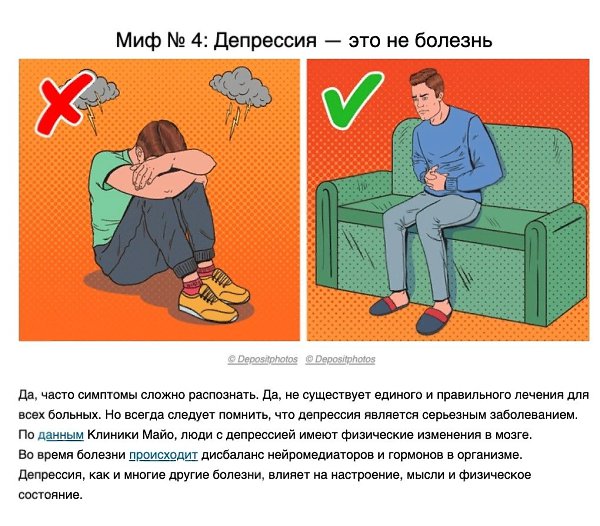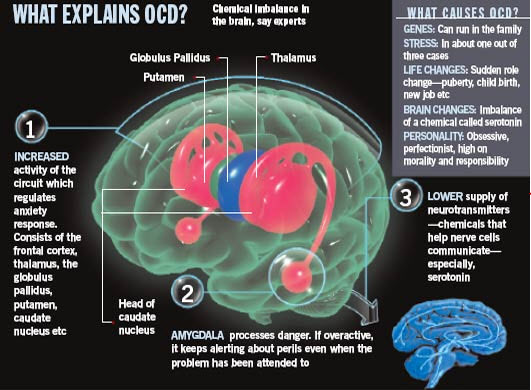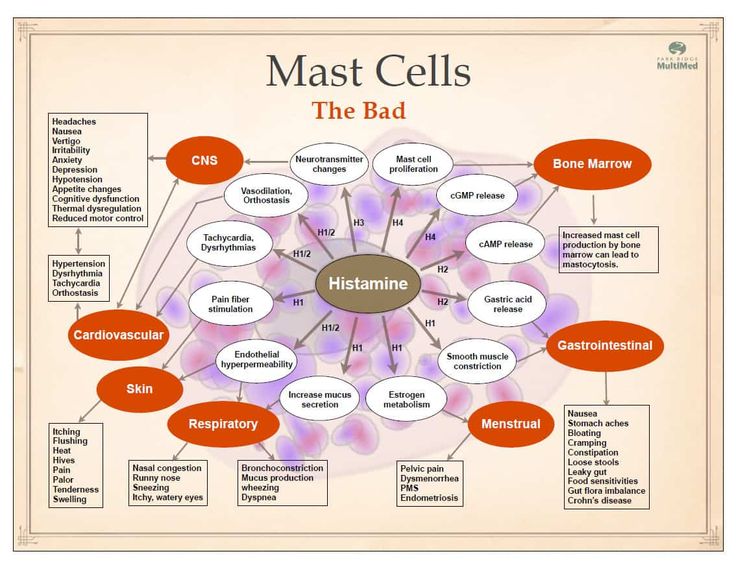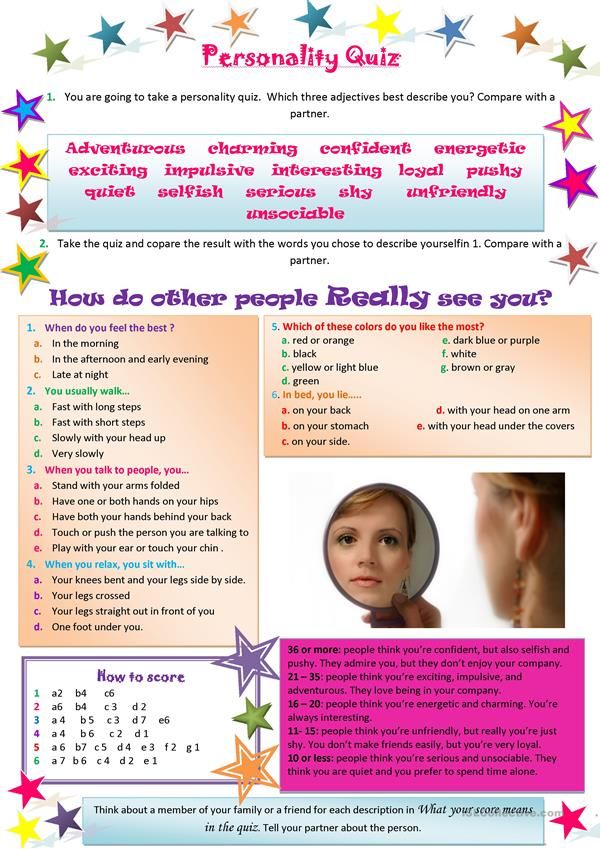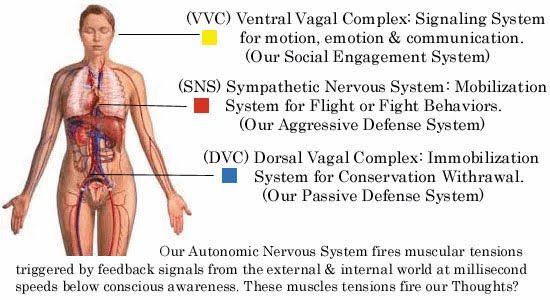Anorexia and cooking for others
Cooking Can Signal Eating Disorder
Parents should take notice if their children return from college and take over the kitchen, baking up a storm. Excessive cooking or preoccupation with food may signal an eating disorder like anorexia.
“Many persons with eating disorders love to cook and will constantly cook and bake for their family or friends,” said Theresa Fassihi, PhD, a psychologist with the Eating Disorders Program at The Menninger Clinic in Houston. “They may bake all day, but not eat a single thing themselves.”
She added that some persons with eating disorders may get vicarious pleasure from watching others eat, and enjoy being in control while others give in to the fattening foods.
While baking is a normal, enjoyable part of the holiday experience, it could be a warning flag if coupled with other signs and symptoms of eating disorders. Eating disorders include anorexia, bulimia, binge eating and over exercising. While eating disorders occur more frequently in women, men may also develop an eating disorder.
Nearly 10 million females and 1 million males are currently struggling with an eating disorder such as anorexia or bulimia, according to the National Eating Disorders Association.
“College is a major life transition, and some young adults develop eating disorders during this time,” Dr. Fassihi said. “They may be scared that they will gain the infamous ‘Freshman 15,’ they may be influenced by their roommates or peers who diet or they may feel pressure to be a certain weight to compete athletically.”
College kids may also believe choosing what to eat and not to eat gives them some sense of control over their new lives and makes them feel safe, Dr. Fassihi added.
Parents may notice changes in their college-aged child’s eating behavior during the holiday season, because many students return home for more than a day or so for the first time since summer. Other signs of eating disorders include:
- Weight loss or change of weight –Watch for a sudden loss or gain. Persons with eating disorders commonly try to hide their weight loss by wearing baggy clothes.
 A person is considered anorexic if his or her body mass index (BMI) is 17.4 or less.
A person is considered anorexic if his or her body mass index (BMI) is 17.4 or less. - Picky eating – Be wary if your child used to eat a variety of foods, but now will only eat some foods and not others, or refuses to eat any foods that aren’t fat free.
- Sudden diet/decision to be a vegetarian – Diets and becoming a vegetarian provide a socially acceptable way for a person with an eating disorder to restrict his or her diet, and to reduce calories. Ask your child about the reasons he or she is going on a diet or becoming a vegetarian.
- Obsession with exercising – “It should raise a red flag if your child gets anxious or scared if he or she has to skip a day of exercising,” Dr. Fassihi said.
- Frequent trips to the bathroom or showers – Young adults with bulimia often attempt to control the amount of calories they consume by purging after a big meal. They may make frequent trips to the bathroom to purge and turn the shower on to muffle their vomiting.
- Large amounts of food missing – Young adults who binge eat may eat normally when in the presence of others.
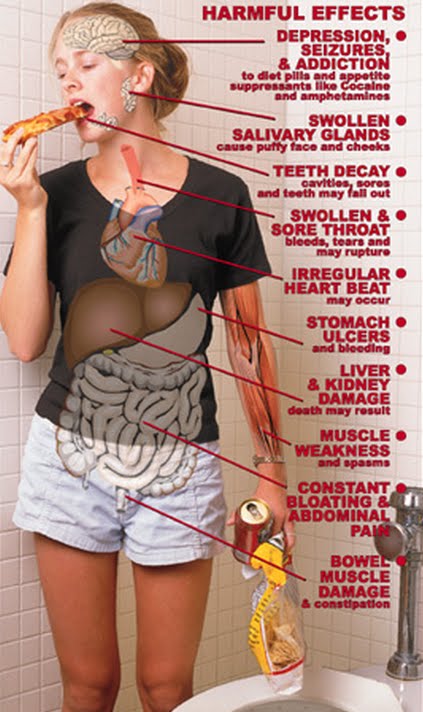 When alone, they eat large quantities of food at one sitting—such as whole bags of cookies, tubs of ice cream and bags of chips. Missing food may the only clue.
When alone, they eat large quantities of food at one sitting—such as whole bags of cookies, tubs of ice cream and bags of chips. Missing food may the only clue. - Change in personality – “Eating disorders change your personality completely,” Dr. Fassihi said. “A normally outgoing person becomes shy and withdrawn and may avoid social events or eating with family or friends.”
If you suspect an eating disorder, talk to your child about your concerns and encourage him or her to see an eating disorder specialist to be evaluated for an eating disorder. If you child denies a problem, emphasize the tremendous health risks of eating disorders including heart problems, permanent bone loss and death.
“Early intervention offers people with eating disorders the best prognosis,” Dr. Fassihi said. “The majority of people who get treatment for eating disorders recover.”
Source: The Menninger Clinic
Why people with eating disorders are often obsessed with food
Lorraine Pascale, a chef and regular guest on the BBC’s cooking programme, Saturday Kitchen, recently admitted that she struggled with an eating disorder. For many, it would seem counter-intuitive that a person with an eating disorder would spend so much time around food. But an obsession with food is often linked with eating disorders, highlighting the complexity of effects that go beyond eating itself.
For many, it would seem counter-intuitive that a person with an eating disorder would spend so much time around food. But an obsession with food is often linked with eating disorders, highlighting the complexity of effects that go beyond eating itself.
Many of us have dieted at some point in our lives. Whether this is to lose weight, maintain weight or be healthier, what they have in common is restriction. This restriction is not merely behavioural – it is not simply the absence of reaching for a biscuit. Rather, the restriction starts in our brains when we tell ourselves that certain foods are off limits. And, much like the famous “don’t mention the war” scene in Fawlty Towers - where a forbidden topic keeps popping up in conversation – people restricting their food intake can become preoccupied with food.
For people with anorexia nervosa, which has restriction at its core, this preoccupation can manifest itself in a strange desire to be near the very thing that is being avoided. Those suffering from anorexia are often obsessed with food – collecting recipes, reading articles, watching cookery shows, cooking for others and preparing meals that they themselves will not eat.
Those suffering from anorexia are often obsessed with food – collecting recipes, reading articles, watching cookery shows, cooking for others and preparing meals that they themselves will not eat.
What drives an obsession with food?
There are two reasons why those with eating disorders might be driven to obsess over food. The first is that this is the brain’s way of telling a starving person that they need to eat. From an evolutionary perspective, this is adaptive. Our brain won’t let us forget that we are in need of fuel. Interesting comparisons can be drawn from a study conducted by American physiologist Ancel Keys after World War II. He wanted to explore the effects of starvation and re-feeding in order to better understand how to help concentration camp victims.
Keys found that those who were starved became obsessed with food, dreaming and talking about it constantly. All other things became insignificant. These thoughts only subsided when they regained body fat. Three of the participants even went on to become chefs, illustrating the great impact that the experience of food deprivation had on their life choices.
Three of the participants even went on to become chefs, illustrating the great impact that the experience of food deprivation had on their life choices.
The second reason that people with eating disorders might obsess over food is related to the need for control that is often central to the development of a disorder. For many sufferers, controlling their eating is a way to feel some mastery in an otherwise emotionally chaotic world. Many people with eating disorders suffer from low self esteem, and often have other mental health problems, such as depression or anxiety. To prepare food and be strong enough not to eat it, reinforces their self-worth and, to some extent, empowers them. Pleasure from food is gained in an almost voyeuristic manner, by watching others eat.
Sapping the brain
But such obsession is not limited just to people with eating disorders. Anyone on a diet that is restrictive is likely to experience preoccupying thoughts.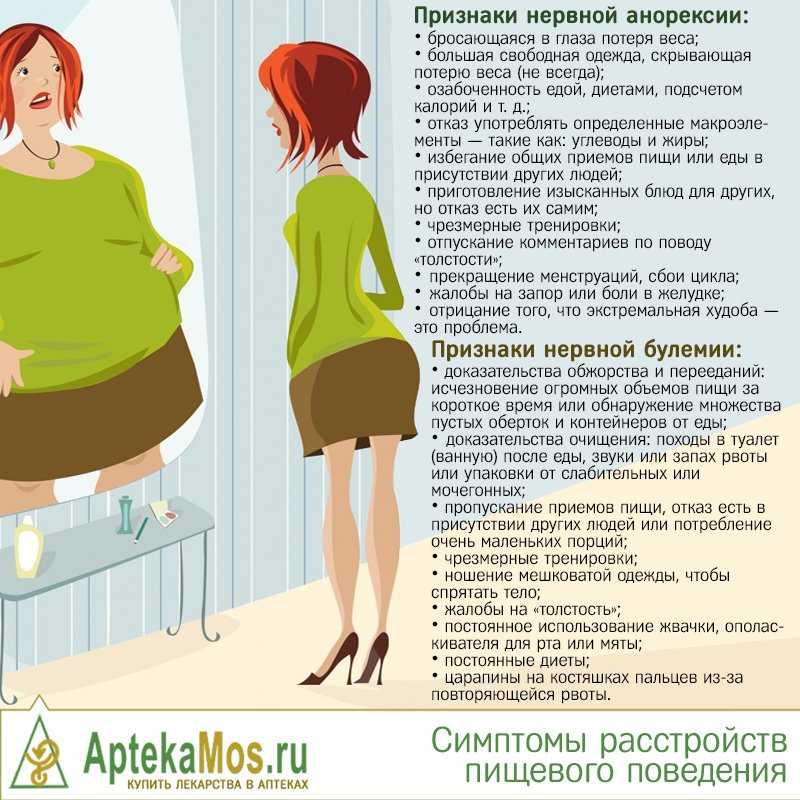 And it saps our brain power. A study, conducted years ago for my PhD, found that successful dieters (those who, when given free access to appealing foods, did not eat much) performed badly on a simple cognitive task. Unsuccessful dieters (those who ate lots of the food) performed very well. This suggested that those who were successful at restricting their intake did so at the expense of their ability to perform another task. But when others decided to ditch the diet, they freed up their brain capacity and performed well. So obsessing over food and trying to maintain a diet can have detrimental effects on our performance.
And it saps our brain power. A study, conducted years ago for my PhD, found that successful dieters (those who, when given free access to appealing foods, did not eat much) performed badly on a simple cognitive task. Unsuccessful dieters (those who ate lots of the food) performed very well. This suggested that those who were successful at restricting their intake did so at the expense of their ability to perform another task. But when others decided to ditch the diet, they freed up their brain capacity and performed well. So obsessing over food and trying to maintain a diet can have detrimental effects on our performance.
Learned obsessions with food
Our relationships with food can be influenced early in life and might affect our propensity to obsess over it. A recent long-term study conducted by colleagues found that mothers who use food as a reward were more likely to have children who overeat when distressed, compared with children of mothers who used less controlling feeding practices. Learning early in life that food provides a source of comfort could play a role in food obsessions later in life.
Learning early in life that food provides a source of comfort could play a role in food obsessions later in life.
Recovery from an eating disorder can be a long process that may take many years, be derailed by relapses and it may never completely go away. Even for those who have recovered, food may always hold a special meaning.
Anorexia: what it is, symptoms, causes, types, how to treat it
Together with an RBC expert Stil tells what are its causes and consequences, and how the disease can be cured.
- What is
- Species
- Stages
- Symptoms
- Causes
- Consequences
- How to treat
- Expert commentary
The material was checked and commented by Elmira Gereeva, psychologist, weight correction and eating behavior consultant, nutritionist, head of the educational department of the School of Emotional Intelligence
Advertising on RBC www.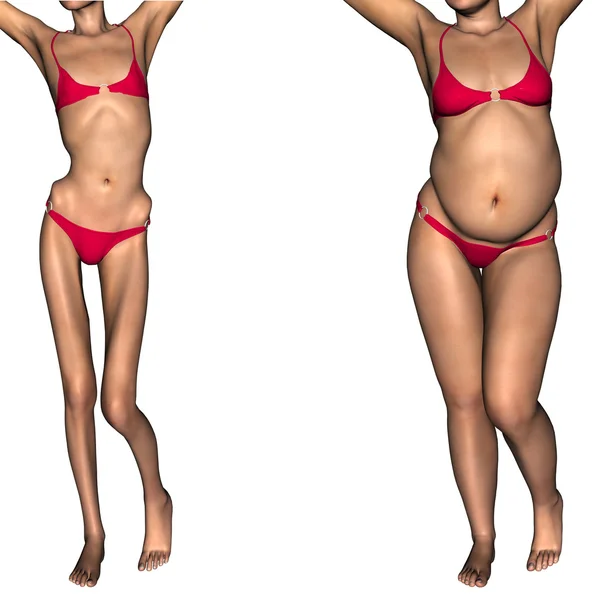 adv.rbc.ru
adv.rbc.ru
What is anorexia
Many people strive to normalize weight, watch their diet, go on diets and limit harmful foods on the menu. But sometimes these processes turn into an obsessive state. Anorexia nervosa is an eating disorder that can lead to severe weight loss. A person with this disease is preoccupied with what and how much he eats, often keeps a strict calorie count, adheres to an extremely meager diet. The decreasing number on the scales is the main aspiration and the only achievement that brings joy. Often, a reduction in food intake is complemented by increased training. nine0003
Anorexia is most common in girls between the ages of 14 and 25, but it is also diagnosed in older women and men. At different times, she was moved by Angelina Jolie, Demi Moore, Victoria Beckham, Mary-Kate Olsen, Yulia Lipnitskaya. At the same time, it is almost impossible to determine anorexia only by external signs.
Types of anorexia
Anorexia is not necessarily a psychological illness. It may be temporary, independent of the patient's desire to normalize weight and pass as soon as possible (for example, the recovery period after poisoning). nine0003
It may be temporary, independent of the patient's desire to normalize weight and pass as soon as possible (for example, the recovery period after poisoning). nine0003
© Shutterstock
In clinical practice, there are several types of eating disorder:
- Primary anorexia. It often occurs against the background of other health pathologies, expressed in a lack of appetite, disorders of the gastrointestinal tract.
- Neuropsychiatric anorexia. It is typical to refuse any food for no apparent reason, but against the background of mental problems, such as paranoia or depression.
- Mental morbid anorexia. Complete loss of the need for food with relatively normal physical and mental well-being. nine0006
- Drug anorexia. Occurs as a side effect of taking drugs designed to solve other health problems, such as antidepressants or stimulants.
- Anorexia nervosa. A conscious refusal to eat due to the all-consuming idea of getting rid of excess weight.
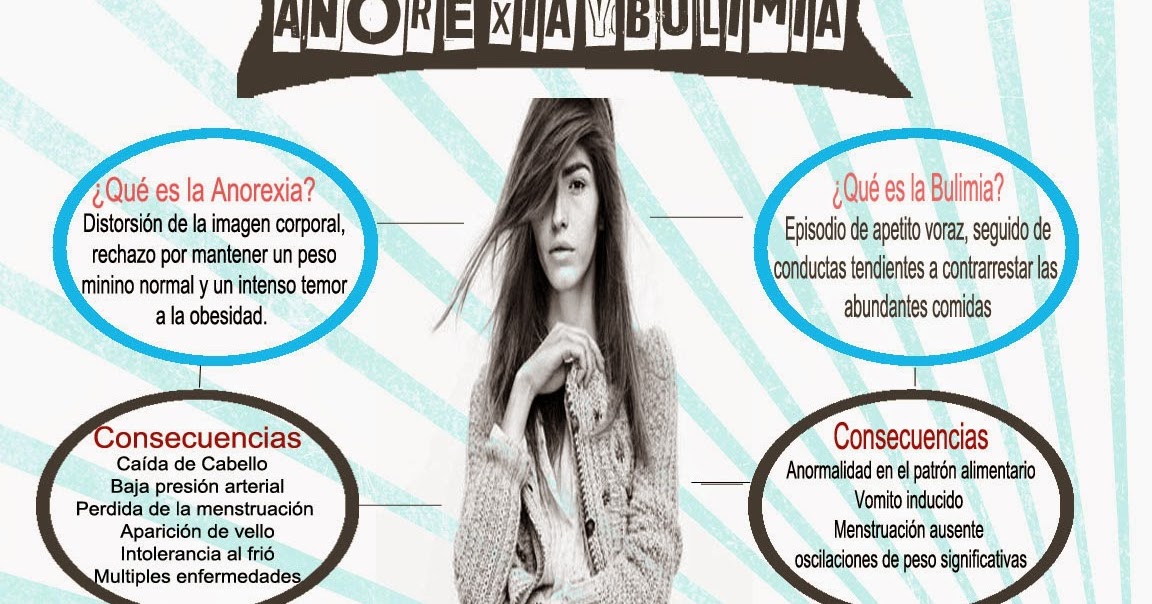
Stages of anorexia
Only a doctor can diagnose anorexia. Do not rush to labeling and diagnosing if you met with an old friend and think that she has lost a lot of weight. This may be due to another illness or prolonged stress. Or maybe - the result of proper nutrition and sports in accordance with the doctor's recommendations. To make a diagnosis, many criteria are taken into account, including heart rate, tests, and a conversation with a psychotherapist. nine0003
Gereeva Elmira:
The stages of development of anorexia nervosa can be divided into several stages:
The first stage. A person decides to lose weight. This stage is characterized by pronounced dysmorphophobia - delusional or overvalued ideas of dissatisfaction with one's own appearance, which trigger mechanisms to prevent this shortcoming. Now the number of diagnosed cases of anorexia nervosa has significantly decreased, but the age threshold is also lowering. Children and teenagers are at risk. nine0003
Children and teenagers are at risk. nine0003
In today's society, the boundaries of a healthy lifestyle have been erased. Due to the lack of knowledge, it is very difficult for people to determine whether now their loved one has simply begun to monitor their diet or is developing an eating disorder. Therefore, most often the first stage of the development of the disease is skipped. After all, improving nutrition and exercising is great. Only no one says what is hidden behind this "idea fix".
Second stage. Characterized by deliberate actions. And it ends at the moment when the weight is reduced by 20-50% of the initial indicators. It all starts with a reduction in daily calorie content, restrictions in a particular food group, or excessive physical activity. nine0003
Further ways to reduce weight depend only on its subjective "severity". Induction of vomiting and use of diuretics or laxatives entail secondary somatoendocrine disorders. This happens about 1-2 years after the person started to lose weight. For example, girls begin amenorrhea.
For example, girls begin amenorrhea.
At this point, the idea of weight loss absorbs a person completely, he thinks only about food and indicators on the scales. The fear of gaining weight back causes disturbing thoughts about every bite eaten. The lower the numbers, the more pronounced somatic disorders: from prolapse of organs, constipation, pain in the stomach to cachexia - an extreme degree of exhaustion of the body. nine0003
Third stage. The resulting pathologies become more pronounced. Thermoregulation is disturbed, hair falls out, teeth are destroyed, the level of physical activity decreases. In addition, a person does not notice objective problems and a decrease in the quality of life. He still continues to go to the "ideal" because of the disturbed perception of his own body. Even at this stage, it is possible to correct the consequences. But the risk of recurrence of the condition, which requires inpatient observation, remains for another two years. nine0003
nine0003
Symptoms of anorexia
People with anorexia nervosa constantly lose weight and appear emaciated. In addition to external manifestations, there are a number of symptoms in the patient's health and lifestyle:
- inability to maintain optimal weight;
- fatigue and insomnia;
- yellowish skin tone, dark or pale patches;
- thinning and hair loss;
- absence of menstruation for several cycles; nine0006
- dry skin;
- low pressure;
- problems with the gastrointestinal tract, lack of stool.
If you notice the following symptoms in your loved ones, they most likely need specialist help.
Constantly cold
Anorexia affects the production of thyroid hormones, which regulate metabolic processes and are responsible for the normal functioning of the immune system. One of the consequences of such an imbalance is a violation of the temperature regime of the body. Due to poor microcirculation and a drop in internal temperature, patients with anorexia are constantly cold [1]. They are given out by multi-layered baggy clothes, which they are forced to wear even in the warm season. nine0003
Due to poor microcirculation and a drop in internal temperature, patients with anorexia are constantly cold [1]. They are given out by multi-layered baggy clothes, which they are forced to wear even in the warm season. nine0003
For the same reason, the body begins to be covered with a layer of thin fluffy hairs - this is how the body tries to keep warm. In addition, due to a weakened immune system, people with this eating disorder are more likely to get colds than others. For example, a common runny nose can easily turn into chronic sinusitis or tonsillitis.
Begins to get involved in cooking
Passion for cooking and the desire to feed everyone around is one of the main symptoms of anorexia. You can recognize the disease by a sudden desire to watch cooking shows, talk a lot about food, collect recipes, read cookbooks and cook sumptuous meals for the family. True, the patient himself is unlikely to touch the prepared dishes. Food begins to occupy all thoughts, but it is no longer associated with what can be taken orally. nine0003
nine0003
Some people think that interest in cooking is an attempt by the brain to remind the body to eat. Others are sure that anorexics get indirect joy and pleasure by watching how others eat. If you notice that a friend is giving her lunch to a pet, throwing away food, or shifting it to other people's plates, this is cause for concern.
Often sad and easily pissed off
Extreme diets lead to nutritional deficiencies [2] and imbalances in certain hormones: serotonin, dopamine, oxytocin, leptin, and cortisol, the stress hormone [3]. Therefore, in patients with anorexia, there are sharp mood swings, and obsessive behavior in relation to food intensifies. For example, some of them begin to wash their hands after each contact with food. nine0003
In addition, endocrine changes cause an increased sense of anxiety and prolonged depression, according to the staff of the Harvard Medical School [4]. The fact is that estrogen and oxytocin help fight fear, reduce stress and anxiety. And the low level of these hormones, which is typical for people with anorexia, makes it difficult to overcome the fear of food. At the same time, pressure from relatives only increases anxiety.
And the low level of these hormones, which is typical for people with anorexia, makes it difficult to overcome the fear of food. At the same time, pressure from relatives only increases anxiety.
© Shutterstock
Tired quickly
Lack of proper nutrition and poor appetite lead to increased fatigue. Since protein-energy deficiency occurs with anorexia, this negatively affects the work of all organs and systems of the body. To maintain life, he is forced to use internal resources, which are far from unlimited. nine0003
As a result, anorexic patients experience a decrease in muscle strength. They begin to tire faster, experience weakness, drowsiness and frequent dizziness [5]. In addition, fainting and malfunctions of the heart (weak pulse, arrhythmia) are possible. The faster the girl loses weight, the more pronounced the unpleasant consequences.
Abruptly loses weight and is afraid to gain weight
The mere thought of the possibility of gaining weight causes a panic attack in patients with anorexia.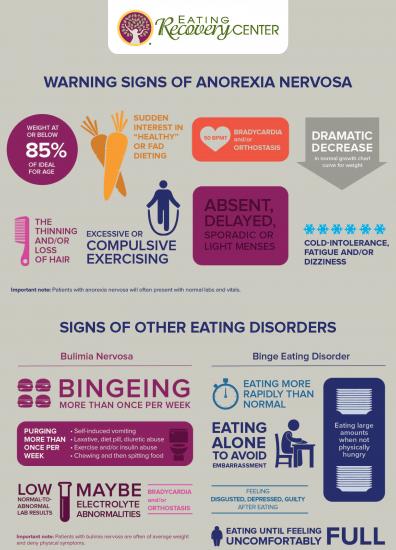 At the same time, it is almost impossible to feed them. To keep the number of calories consumed to a minimum, not all girls refuse food. nine0003
At the same time, it is almost impossible to feed them. To keep the number of calories consumed to a minimum, not all girls refuse food. nine0003
They use different methods to reduce body weight. According to a study by American psychologists [6], 86% of people with eating disorders artificially induce vomiting, 56% abuse laxatives, and another 49% use diuretics.
In addition to changes in behavior, over time, external signs of the disease begin to appear. Among them are a sharp weight loss, sunken cheeks and stomach, blue bags under the eyes, protruding collarbones, pointed knees and elbows. At the same time, the skin becomes dry and pale, and the hair becomes brittle and dull. nine0003
Becomes withdrawn and uncommunicative
When the desire to lose weight becomes an obsession, the range of interests narrows. A patient with anorexia becomes withdrawn and uncommunicative, gradually losing contact with relatives and friends. Since at this moment a person is left alone with his problem, he begins to seek support in the circle of like-minded people who are losing weight.
Since at this moment a person is left alone with his problem, he begins to seek support in the circle of like-minded people who are losing weight.
As a rule, people with anorexia find each other in special communities that promote the disease. There they share daily reports and life hacks that help them on their way to the “perfect body”. System administrators do not keep track of such malicious content, so these groups continue to exist [7]. According to Canadian researchers [8], social media is one of the main catalysts for the development of eating disorders. nine0003
Constantly counting calories
Strict calorie counting is another rule that anorexics follow. They register every food they eat. As a rule, such girls reduce the calorie intake to 400–700 per day [9].
At the same time, many start so-called "food diaries". They are published in social networks using the hashtag #anorexiadnevnik. For some, the disease begins with a harmless rejection of sweets and starchy foods, while others decide to give up meat or become a vegan. From the outside, it may seem that everything happens within the framework of the concept of a healthy diet, so relatives perceive these restrictions as a teenage whim. But soon the diet is reduced to a few “safe” low-fat foods, and mood begins to depend on the number on the scale. nine0003
From the outside, it may seem that everything happens within the framework of the concept of a healthy diet, so relatives perceive these restrictions as a teenage whim. But soon the diet is reduced to a few “safe” low-fat foods, and mood begins to depend on the number on the scale. nine0003
© Shutterstock
Exercising and walking a lot
Extreme dieting is often accompanied by exhausting workouts in anorexics. In this way, patients punish themselves for eating and burn calories that have entered the body. According to the results of a study [10] conducted by Italian doctors, 45% of patients with eating disorders resorted to heavy physical exertion.
This phenomenon is more common in women than in men, according to scientists from La Trobe University in Australia [11]. With anorexia, thoughts about training become obsessive: when, for some reason, patients miss classes, they experience a strong sense of guilt [12]. nine0003
If a friend starts walking a lot and torturing herself with prolonged physical activity, she most likely needs help, psychiatrists warn [13].
Complains of menstrual irregularities
Reducing portion size and number of meals negatively affects the synthesis of leptin and insulin, hormones that regulate appetite. Their deficiency leads to various metabolic and neuroendocrine disorders. For example, the patient's bones become looser and more fragile, and therefore the risk of fractures increases significantly. nine0003
In addition, with anorexia, the production of sex hormones decreases, due to which sexual growth slows down, the reproductive function of the body is disturbed and sexual desire disappears. As a rule, along with the loss of kilograms in patients with anorexia, the menstrual cycle is interrupted.
And with a lack of leptin, the brain ceases to control the process of losing weight. As a result, the body begins to quickly lose weight and reject incoming food at the cellular level.
Considers himself fat
Anorexics cannot objectively assess their figure.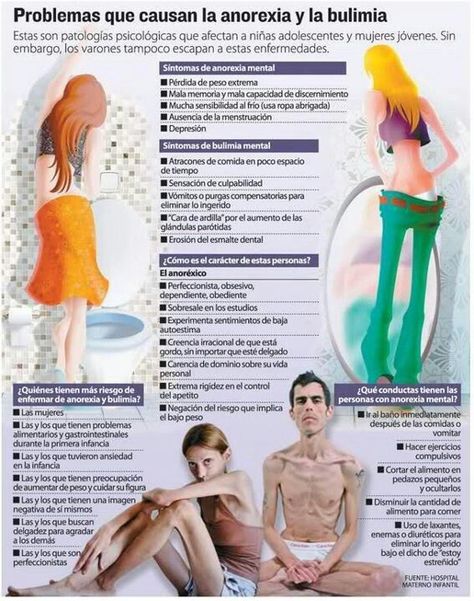 They spend a lot of time in front of the mirror and consider themselves fat [14], even when everyone around them says that they are exhausted. This is a feature of the disease: the perception of the body is distorted [15], so the ideal weight for such girls is unattainable.
They spend a lot of time in front of the mirror and consider themselves fat [14], even when everyone around them says that they are exhausted. This is a feature of the disease: the perception of the body is distorted [15], so the ideal weight for such girls is unattainable.
French researchers conducted an interesting experiment [16]. They invited 50 participants, half of whom suffered from anorexia. The girls were asked to visually assess whether they could pass through a narrow doorway. nine0003
The results of the study showed that participants with eating disorders overestimate body size. They feel bigger than they really are. Scientists believe this is due to disorders of the central nervous system. Girls saw themselves the same as they were before anorexia.
© Shutterstock
Causes of anorexia
The exact cause of the diagnosis is unknown. People who develop anorexia may suffer from perfectionism and constantly strive for an unattainable ideal or be characterized by excessive anxiety and look for ways to control their lives.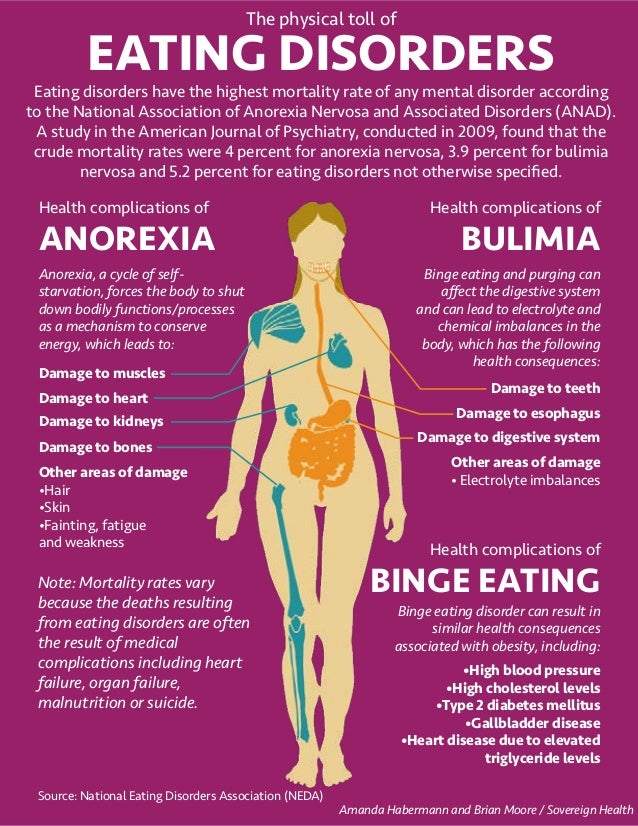 Doctors identify several main factors prone to eating disorders:
Doctors identify several main factors prone to eating disorders:
- Biological. Genetics and hormones can lead to the development of anorexia nervosa. It is especially associated with low levels of serotonin.
- Social. Intrusive images of thin people broadcast in magazines, social networks and videos can affect how a person perceives himself. We inevitably compare ourselves with others, especially if they are beautiful and successful.
- Psychological. People with obsessive-compulsive disorder (OCD) tend to diet and exercise rigorously due to obsessions and compulsions. nine0006
Consequences of anorexia
Eating disorders cause many serious complications. Sometimes they lead to death, and often suddenly, without prior excessive weight loss. This is due to an abnormal heart rhythm or an imbalance of electrolytes—vital minerals—sodium, calcium, and potassium.
Other complications of anorexia can be cardiovascular problems such as mitral valve prolapse and heart failure. Often, the disease is accompanied by loss of muscle and bone mass, leading to an increased risk of fractures. Anorexia leads to hormonal disorders and diseases of the stomach, chronic renal failure. nine0003
Often, the disease is accompanied by loss of muscle and bone mass, leading to an increased risk of fractures. Anorexia leads to hormonal disorders and diseases of the stomach, chronic renal failure. nine0003
© Siora Photography/Unsplash
How to Treat Anorexia
One of the biggest challenges in treating anorexic patients is their lack of desire to change. Sometimes a person does not agree to the help of a doctor, even when it becomes obvious that the quality of life is suffering. Lack of energy and strength, physical and nervous exhaustion, depression, inability to eat for a long time are already the extreme stages of an eating disorder. The main goal of treatment is to return the body to normal weight and develop proper eating habits without strict restrictions and hunger strikes. Therefore, a nutritionist works together with a therapist and a psychiatrist, who will help to create a menu and gradually return the patient to the joy of eating. Comprehensive treatment includes:
- Individual therapy.
 Cognitive-behavioral methods help to change the vector of thinking, learn to cope with strong emotions and increase self-esteem.
Cognitive-behavioral methods help to change the vector of thinking, learn to cope with strong emotions and increase self-esteem. - Family therapy. It is good if not only anorexia sufferer participates in therapeutic sessions with a psychiatrist, but also his relatives and friends. To create a favorable atmosphere for all participants in the process, it is important to learn how to resolve conflicts, as well as adhere to a healthy lifestyle.
- Group therapy. These sessions allow people with identical problems to communicate with each other. All conversations are held with the participation and under the supervision of a doctor, otherwise they can turn into competitions between those who want to lose weight even more. nine0006
- Medical treatment. There is currently no cure for anorexia, but doctors can prescribe pills to combat the disease's symptoms of depression and anxiety.
- Hospitalization. Depending on the degree of weight loss, the patient can be treated as an outpatient or inpatient.
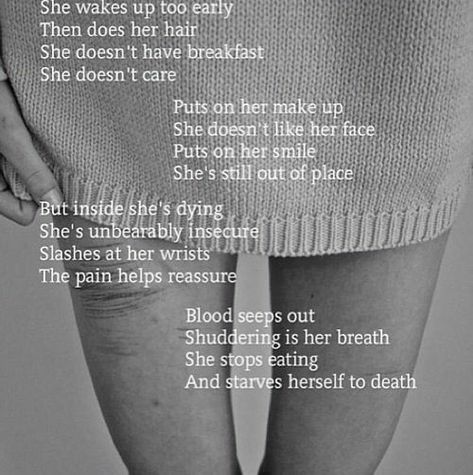 In some cases, a feeding tube and droppers are indicated to keep the body alive, especially with severe dehydration.
In some cases, a feeding tube and droppers are indicated to keep the body alive, especially with severe dehydration.
Many people cope with anorexia and return to a full life. However, there are patients who cannot be saved. This usually happens due to untimely access to specialists, when the body is exhausted to such an extent that there are irreversible malfunctions in the work of internal organs. Some people require lifelong support from a psychologist and work with groups of patients suffering from eating disorders.
There is no proven method to prevent anorexia nervosa, it can occur unpredictably as a result of severe psychological shocks. But observing the symptoms of the disorder helps in rapid diagnosis, subsequent treatment, and recovery. Do not hesitate to seek professional help from doctors if you suspect violations in yourself and your loved ones. nine0003
Expert comment
Elmira Gereeva. Psychologist, consultant in weight management and eating behavior, nutritionist, head of the educational department of the School of Emotional Intelligence
Anorexia nervosa is one of the most terrible mental disorders. It is diagnosed based on a low BMI (body mass index). This line is outlined in the diagnostic criteria (according to ICD-10 below 17.5). In people with ED, the highest risk of death is observed precisely in connection with this disease [17]. Anorexia nervosa is characterized by a deliberate reduction in body weight, which (which is very important) is caused by the person himself. Conventionally, there are two types of anorexia nervosa: purgative and restrictive. nine0003
It is diagnosed based on a low BMI (body mass index). This line is outlined in the diagnostic criteria (according to ICD-10 below 17.5). In people with ED, the highest risk of death is observed precisely in connection with this disease [17]. Anorexia nervosa is characterized by a deliberate reduction in body weight, which (which is very important) is caused by the person himself. Conventionally, there are two types of anorexia nervosa: purgative and restrictive. nine0003
Restrictive anorexia nervosa occurs without episodes of body cleansing. And catastrophic weight loss is due to hunger strikes and excessive physical exertion. Cleansing anorexia nervosa is characterized by episodes of inducing vomiting after an attack of overeating, as well as the use of medications (laxatives, diuretics).
Dehydration in anorexia is due to a general tendency to starvation. At some point, in order to reduce the feeling of hunger, a person can increase the consumption of zero-calorie liquids.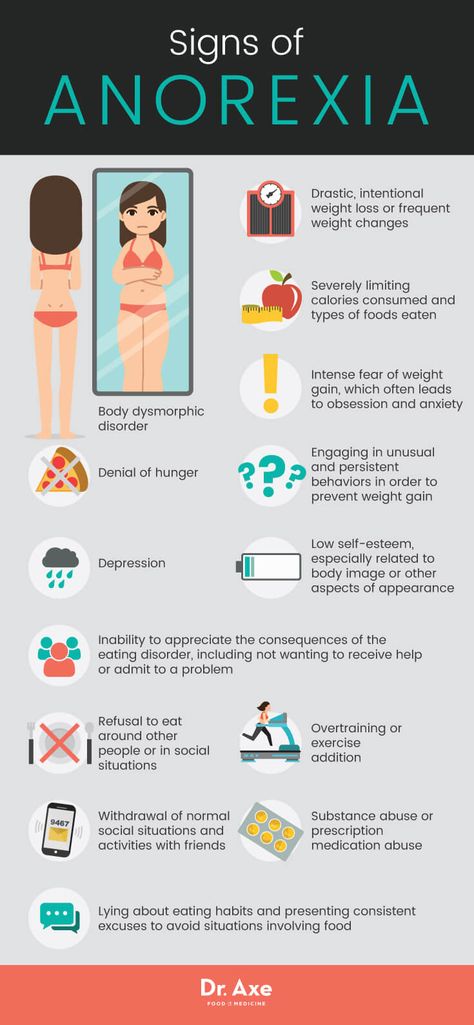 It is in this case that the risk of mortality increases. Recovery from anorexia is a very complex process. A good indicator is when a person has returned to his optimal BMI. The disease is often corrected in the hospital. Based on the clinical picture, a panel of specialists decides which diet is best for the patient. Most often, in addition to increasing the daily calorie content, droppers and Nutrizone are attached to it - feeding through a tube. nine0003
It is in this case that the risk of mortality increases. Recovery from anorexia is a very complex process. A good indicator is when a person has returned to his optimal BMI. The disease is often corrected in the hospital. Based on the clinical picture, a panel of specialists decides which diet is best for the patient. Most often, in addition to increasing the daily calorie content, droppers and Nutrizone are attached to it - feeding through a tube. nine0003
In order not to reach critical numbers on the scales and restore health, it is enough to adhere to standard principles of healthy eating, for example, Dietary Guidelines for Americans [18]. Remember to follow the WHO recommendations for physical activity. This will be enough. No need to chase the ideal and bring yourself to anorexia, which is impossible to get sick for a long time - the body will not stand it. If you cannot cope on your own, be sure to contact the experts. You should not deny the existence of a problem, as it will declare itself in any case. Focus on your state of health and remember that you have one. nine0003
Focus on your state of health and remember that you have one. nine0003
Tags: fitness , diets , proper nutrition , psychology
Signs of anorexia - tell
What is anorexia?
Many people strive to normalize their weight, watch their diet, go on diets and limit harmful foods on the menu, RBC reports.
But sometimes these processes become obsessive. Anorexia nervosa is an eating disorder that can lead to severe weight loss. A person with this disease is preoccupied with what and how much he eats, often keeps a strict calorie count, adheres to an extremely meager diet. The decreasing number on the scales is the main aspiration and the only achievement that brings joy. Often, a reduction in food intake is complemented by increased training. nine0003
Types of anorexia
Anorexia is not necessarily a psychological illness. It may be temporary, independent of the patient's desire to normalize weight and pass as soon as possible (for example, the recovery period after poisoning).
In clinical practice, there are several types of eating disorders:
- Primary anorexia. It often occurs against the background of other health pathologies, expressed in a lack of appetite, disorders of the gastrointestinal tract. nine0006
- Neuropsychiatric anorexia.
 It is typical to refuse any food for no apparent reason, but against the background of mental problems, such as paranoia or depression.
It is typical to refuse any food for no apparent reason, but against the background of mental problems, such as paranoia or depression. - Mental morbid anorexia. Complete loss of the need for food with relatively normal physical and mental well-being. nine0005 Drug anorexia. Occurs as a side effect of taking drugs designed to solve other health problems, such as antidepressants or stimulants.
- Anorexia nervosa. A conscious refusal to eat due to the all-consuming idea of getting rid of excess weight.
Stages of anorexia
Only a doctor can diagnose anorexia. Do not rush to labeling and diagnosing if you met with an old friend and think that she has lost a lot of weight.![]() This may be due to another illness or prolonged stress. Or maybe - the result of proper nutrition and sports in accordance with the doctor's recommendations. To make a diagnosis, many criteria are taken into account, including heart rate, tests, and a conversation with a psychotherapist. nine0003
This may be due to another illness or prolonged stress. Or maybe - the result of proper nutrition and sports in accordance with the doctor's recommendations. To make a diagnosis, many criteria are taken into account, including heart rate, tests, and a conversation with a psychotherapist. nine0003
The stages of development of anorexia nervosa can be divided into several stages:
First stage. The person decides to lose weight. This stage is characterized by pronounced dysmorphophobia - delusional or overvalued ideas of dissatisfaction with one's own appearance, which trigger mechanisms to prevent this shortcoming. Now the number of diagnosed cases of anorexia nervosa has significantly decreased, but the age threshold is also lowering. Children and teenagers are at risk. nine0003
In today's society, the boundaries of a healthy lifestyle have been erased. Due to the lack of knowledge, it is very difficult for people to determine whether now their loved one has simply begun to monitor their diet or is developing an eating disorder. Therefore, most often the first stage of the development of the disease is skipped. After all, improving nutrition and exercising is great. Only no one says what is hidden behind this "idea fix".
Therefore, most often the first stage of the development of the disease is skipped. After all, improving nutrition and exercising is great. Only no one says what is hidden behind this "idea fix".
Second stage. It is characterized by deliberate actions. And it ends at the moment when the weight is reduced by 20-50% of the initial indicators. It all starts with a reduction in daily calorie content, restrictions in a particular food group, or excessive physical activity. nine0003
Further ways to reduce weight depend only on its subjective "severity". Induction of vomiting and use of diuretics or laxatives entail secondary somatoendocrine disorders. This happens about 1-2 years after the person started to lose weight. For example, girls begin amenorrhea.
At this point, the idea of weight loss absorbs a person completely, he thinks only about food and indicators on the scales. The fear of gaining weight back causes disturbing thoughts about every bite eaten. The lower the numbers, the more pronounced somatic disorders: from prolapse of organs, constipation, pain in the stomach to cachexia - an extreme degree of exhaustion of the body.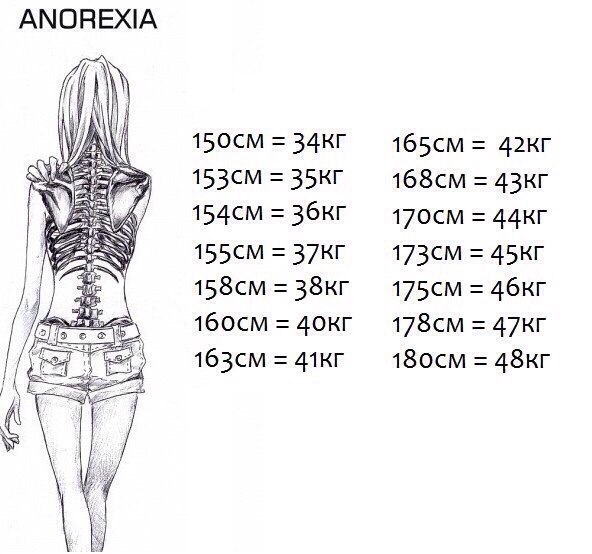 nine0003
nine0003
Third stage. The resulting pathologies become more pronounced. Thermoregulation is disturbed, hair falls out, teeth are destroyed, the level of physical activity decreases. In addition, a person does not notice objective problems and a decrease in the quality of life. He still continues to go to the "ideal" because of the disturbed perception of his own body. Even at this stage, it is possible to correct the consequences. But the risk of recurrence of the condition, which requires inpatient observation, remains for another two years. nine0003
Symptoms of anorexia
People with anorexia nervosa constantly lose weight and appear emaciated. In addition to external manifestations, there are a number of symptoms in the patient's well-being and lifestyle:
- inability to maintain optimal weight;
- fatigue and insomnia;
- yellowish skin tone, dark or pale patches; nine0006
- thinning and hair loss;
- absence of menstruation for several cycles;
- dry skin;
- low pressure; nine0005 problems with the gastrointestinal tract, lack of stool.

If you notice the following symptoms in your loved ones, they most likely need specialist help.
Constantly cold
Anorexia affects the production of thyroid hormones that regulate metabolic processes and are responsible for the normal functioning of the immune system. One of the consequences of such an imbalance is a violation of the temperature regime of the body. Due to poor microcirculation and a drop in internal temperature, patients with anorexia are constantly cold. They are given out by multi-layered baggy clothes, which they are forced to wear even in the warm season. nine0003
For the same reason, the body begins to be covered with a layer of thin fluffy hairs - this is how the body tries to keep warm. In addition, due to a weakened immune system, people with this eating disorder are more likely to get colds than others. For example, a common runny nose can easily turn into chronic sinusitis or tonsillitis.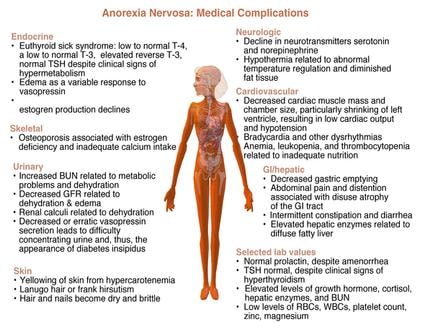
Begins to get involved in cooking
Passion for cooking and the desire to feed everyone around is one of the main symptoms of anorexia. You can recognize the disease by a sudden desire to watch cooking shows, talk a lot about food, collect recipes, read cookbooks and cook sumptuous meals for the family. True, the patient himself is unlikely to touch the prepared dishes. Food begins to occupy all thoughts, but it is no longer associated with what can be taken orally. nine0003
Some people think that interest in cooking is an attempt by the brain to remind the body to eat. Others are sure that anorexics get indirect joy and pleasure by watching how others eat. If you notice that a friend is giving her lunch to a pet, throwing away food, or shifting it to other people's plates, this is cause for concern.
Often sad and easily pissed off
Extreme diets lead to nutritional deficiencies and imbalances in certain hormones: serotonin, dopamine, oxytocin, leptin, and cortisol, the stress hormone. Therefore, in patients with anorexia, there are sharp mood swings, and obsessive behavior in relation to food intensifies. For example, some of them begin to wash their hands after each contact with food. nine0003
Therefore, in patients with anorexia, there are sharp mood swings, and obsessive behavior in relation to food intensifies. For example, some of them begin to wash their hands after each contact with food. nine0003
In addition, endocrine changes cause increased anxiety and prolonged depression, according to the staff of Harvard Medical School. The fact is that estrogen and oxytocin help fight fear, reduce stress and anxiety. And the low level of these hormones, which is typical for people with anorexia, makes it difficult to overcome the fear of food. At the same time, pressure from relatives only increases anxiety.
Gets tired quickly
Lack of proper nutrition and poor appetite lead to increased fatigue. Since protein-energy deficiency occurs with anorexia, this negatively affects the work of all organs and systems of the body. To maintain life, he is forced to use internal resources, which are far from unlimited. nine0003
As a result, anorexic patients experience a decrease in muscle strength.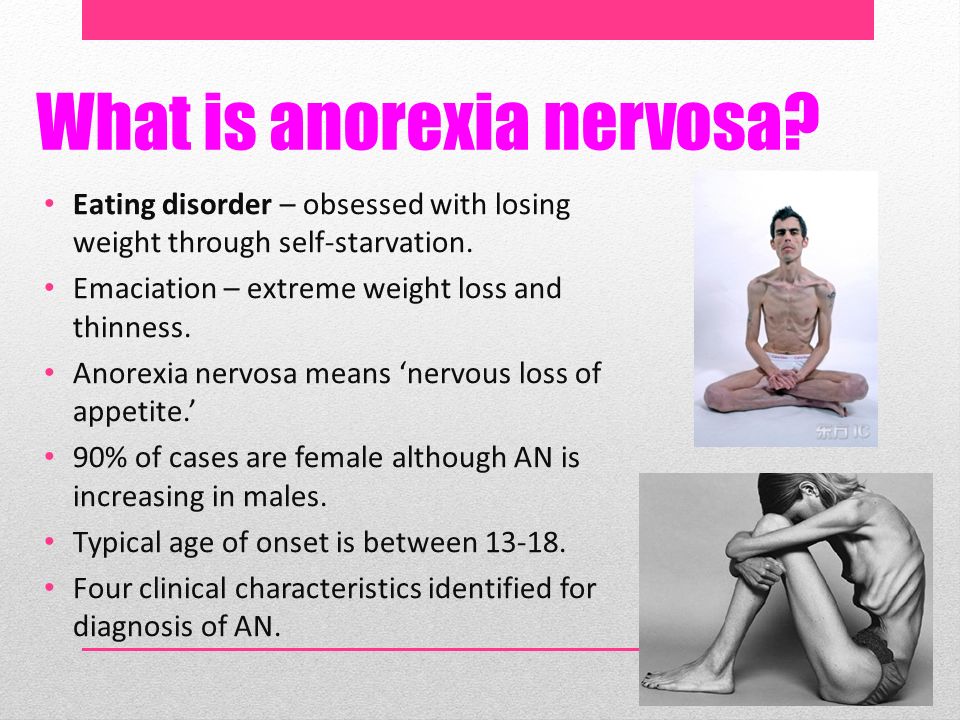 They begin to tire faster, experience weakness, drowsiness and frequent dizziness [5]. In addition, fainting and malfunctions of the heart (weak pulse, arrhythmia) are possible. The faster the girl loses weight, the more pronounced the unpleasant consequences.
They begin to tire faster, experience weakness, drowsiness and frequent dizziness [5]. In addition, fainting and malfunctions of the heart (weak pulse, arrhythmia) are possible. The faster the girl loses weight, the more pronounced the unpleasant consequences.
Abruptly loses weight and is afraid to gain weight
The mere thought of the possibility of gaining weight causes a panic attack in patients with anorexia. At the same time, it is almost impossible to feed them. To keep the number of calories consumed to a minimum, not all girls refuse food. nine0003
They use different methods to reduce body weight. According to a study by American psychologists, 86% of people with eating disorders artificially induce vomiting, 56% abuse laxatives, and another 49% diuretics.
In addition to changes in behavior, over time, external signs of the disease begin to appear. Among them are a sharp weight loss, sunken cheeks and stomach, blue bags under the eyes, protruding collarbones, pointed knees and elbows. At the same time, the skin becomes dry and pale, and the hair becomes brittle and dull. nine0003
At the same time, the skin becomes dry and pale, and the hair becomes brittle and dull. nine0003
Becomes withdrawn and unsociable
When the desire to lose weight becomes an obsession, the range of interests narrows. A patient with anorexia becomes withdrawn and uncommunicative, gradually losing contact with relatives and friends. Since at this moment a person is left alone with his problem, he begins to seek support in the circle of like-minded people who are losing weight.
Exercises a lot and walks a lot
In anorexia, an extreme diet is often accompanied by exhausting workouts. In this way, patients punish themselves for eating and burn calories that have entered the body. According to the results of a study conducted by Italian doctors, 45% of patients with eating disorders resorted to heavy physical exertion. nine0003
Complains of menstrual irregularities
Reducing the size of portions and number of meals negatively affects the synthesis of leptin and insulin, hormones that regulate appetite. Their deficiency leads to various metabolic and neuroendocrine disorders. For example, the patient's bones become looser and more fragile, and therefore the risk of fractures increases significantly.
Their deficiency leads to various metabolic and neuroendocrine disorders. For example, the patient's bones become looser and more fragile, and therefore the risk of fractures increases significantly.
In addition, with anorexia, the production of sex hormones decreases, due to which sexual growth slows down, the reproductive function of the body is disturbed and sexual desire disappears. As a rule, along with the loss of kilograms in patients with anorexia, the menstrual cycle is interrupted. nine0003
And with a lack of leptin, the brain ceases to control the process of losing weight. As a result, the body begins to quickly lose weight and reject incoming food at the cellular level.
Considers himself fat
Anorexics cannot objectively assess their figure. They spend a lot of time in front of the mirror and consider themselves fat, even when everyone around them says that they are exhausted. This is a feature of the disease: the perception of the body is distorted, so the ideal weight for such girls is unattainable.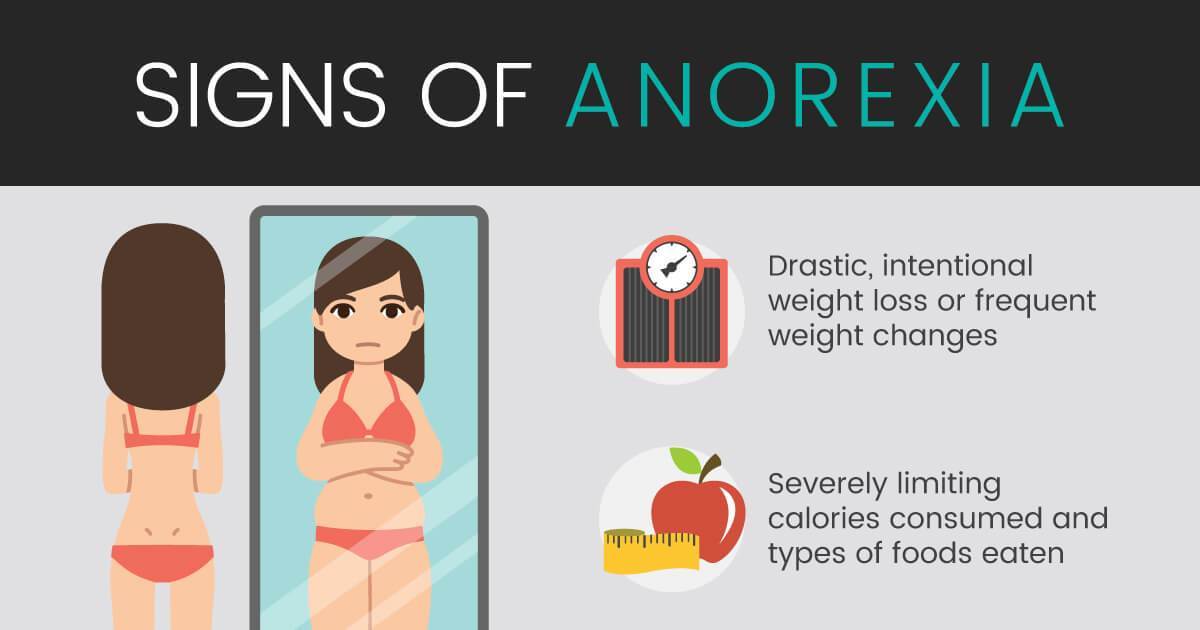 nine0003
nine0003
Causes of anorexia
The exact cause of the diagnosis is unknown. People who develop anorexia may suffer from perfectionism and constantly strive for an unattainable ideal or be characterized by excessive anxiety and look for ways to control their lives. Doctors distinguish several main factors of propensity to eating disorders:
- Biological. Genetics and hormones can lead to the development of anorexia nervosa. It is especially associated with low levels of serotonin. nine0006
- Social. Intrusive images of thin people broadcast in magazines, social networks and videos can affect how a person perceives himself. We inevitably compare ourselves with others, especially if they are beautiful and successful.
- Psychological. People with obsessive-compulsive disorder (OCD) tend to diet and exercise rigorously due to obsessions and compulsions.
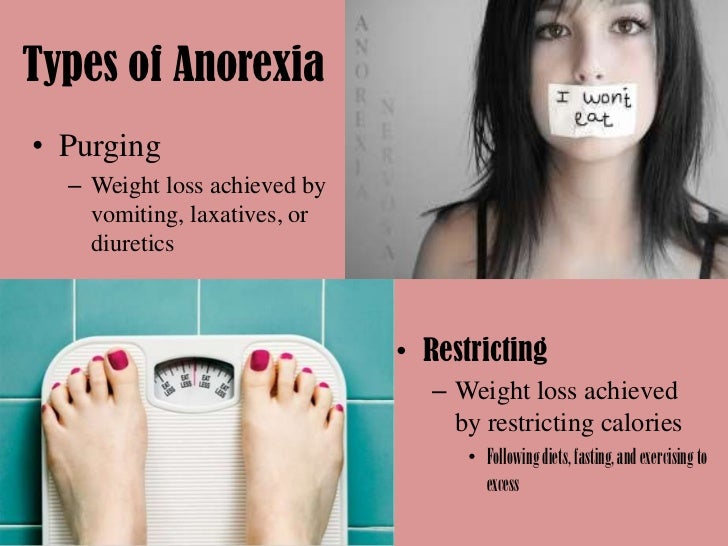
Learn more
